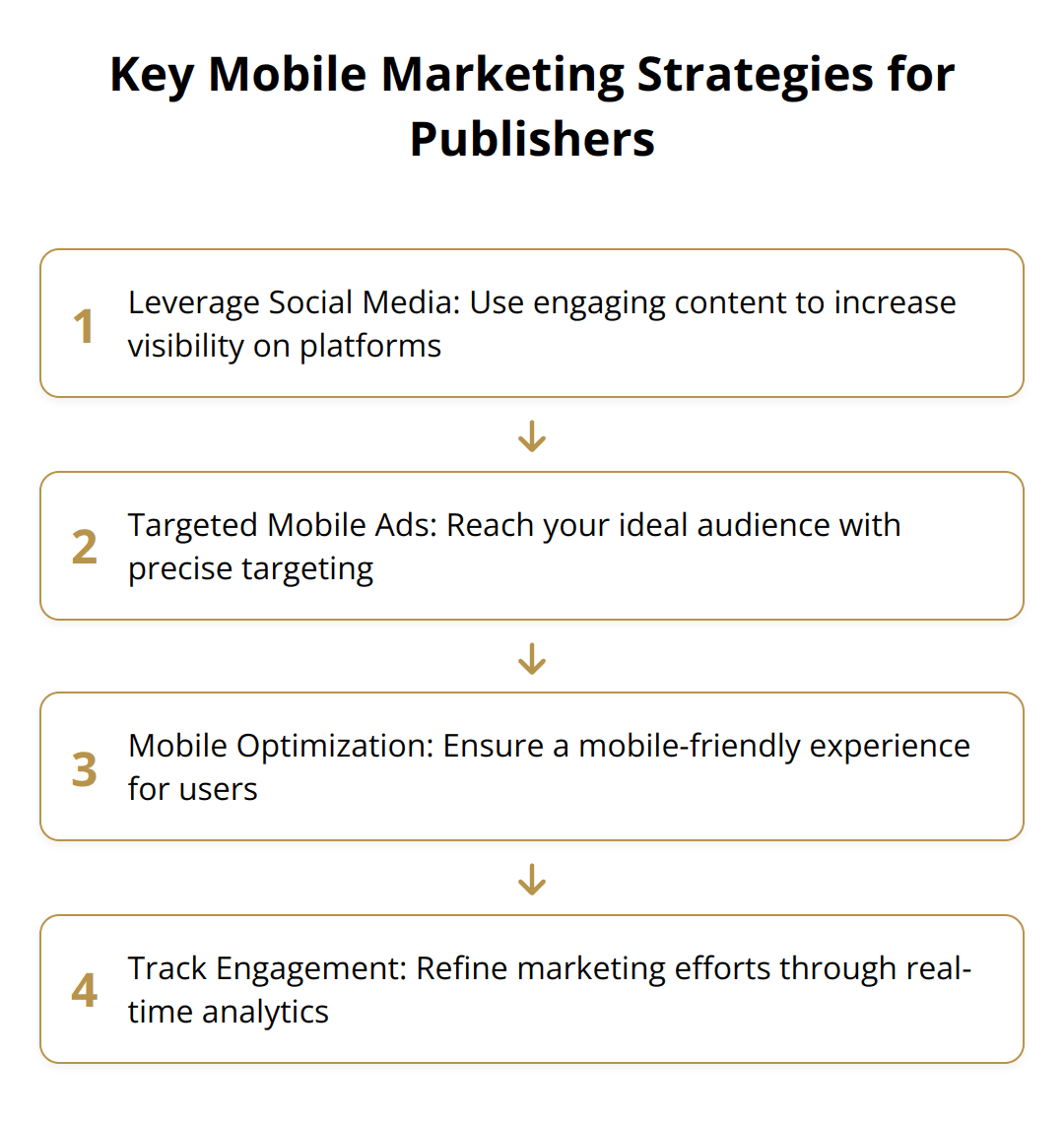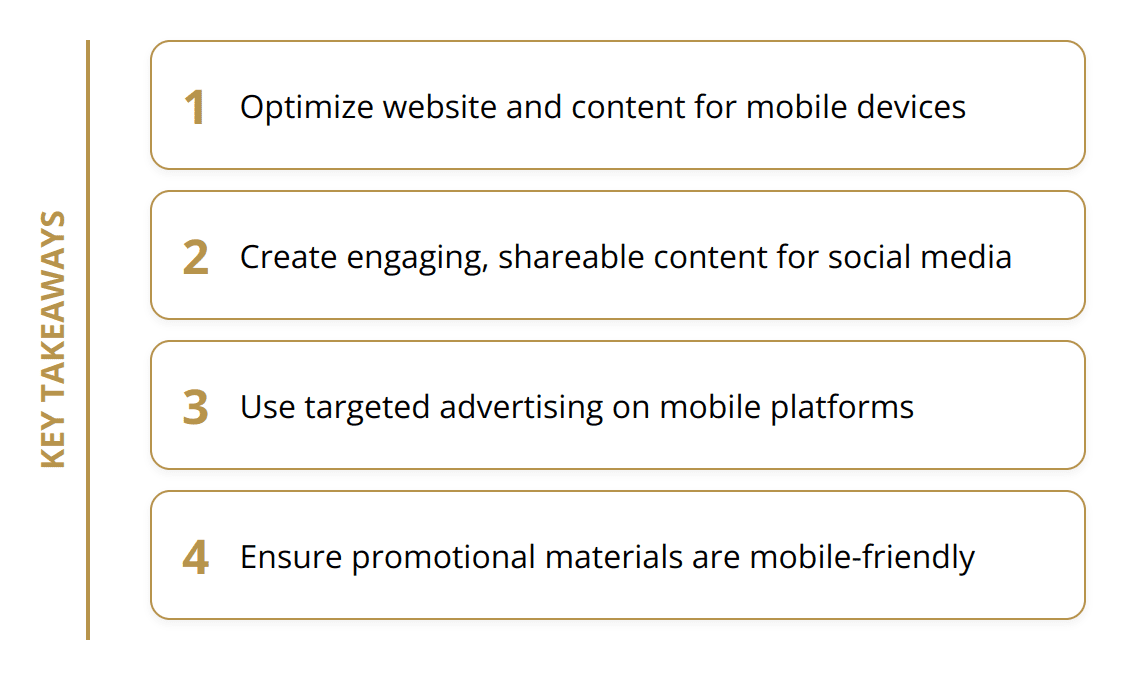by Andrea Albright

At Beverly Hills Publishing, we understand the evolving digital landscape and its impact on the publishing industry. With the rise in mobile device use, it’s clear that mobile marketing has become a key player in promoting books.
Adapting to this trend not only expands your reach but also connects you with readers where they spend most of their time: on their smartphones. Let’s explore the essentials of mobile marketing for books and how it opens doors to wider audiences.
Mobile Marketing for Books
The digital age has ushered in a new era where mobile devices are at the center of consumer interaction, vastly influencing the book industry. The rapid increase in mobile users worldwide has made mobile marketing not just an option but a necessity for authors and publishers aiming to reach a broader audience.
With nearly 84% of the global population owning a smartphone, equating to about 6.6 billion people, the potential reach for mobile marketing campaigns is immense. This surge in smartphone ownership signifies a shift in how content, including books, is consumed. Also, given that more than 50% of online traffic comes from mobile devices, it becomes evident why targeting mobile users is essential.

Engagement through mobile devices is further accentuated by increased screen time, as individuals spend significant portions of their day on their smartphones. Whether it’s scrolling through social media, reading news, or shopping online, mobile devices have become a primary touchpoint for many. This behavior extends to how readers discover and engage with books. Optimizing book marketing strategies for mobile can enhance visibility and directly influence reading habits.
Moreover, there’s a distinct preference for mobile browsing over desktop among consumers. The convenience and immediacy of smartphones allow users to access information and make purchases anytime and anywhere. For the book industry, this means that having a mobile-optimized strategy is not just beneficial but critical. Websites, online book tours, and even book trailers need to be designed with mobile users in mind to ensure effective engagement.
To capitalize on this shift towards mobile, consider incorporating the following:
- Responsive Design: Ensure your website, blog, and any online content related to your book adapts seamlessly to mobile screens.
- Social Media Integration: Leverage platforms like Instagram and Twitter, where readers are likely to discover new books.
- SMS and Messaging Apps: Use personalized messages or updates to keep your readers engaged and informed about new releases or events.

The strategic use of mobile marketing opens up a world of opportunities for authors and publishers to connect with readers in a more personalized and immediate way. Ignoring this trend is no longer an option if you want to stay competitive and relevant in today’s fast-paced digital environment. For more insights on creating effective book marketing strategies, explore our resources on book marketing. By embracing mobile marketing, you unlock the door to a wider, more engaged audience ready to discover your next big hit.
Boosting Book Visibility on Mobile
In a world where the majority of online traffic comes from mobile devices, optimizing content for mobile users isn’t just suggested; it’s imperative for success. Gone are the days when readers only discovered new books through brick-and-mortar stores or desktop searches. Today, they’re scrolling through social media, browsing on their smartphones, and relying on personalized recommendations delivered directly to their devices. Here’s how you can leverage mobile marketing to elevate your book’s visibility and connect with your audience more effectively.
First, ensuring that your content is mobile-friendly is vital. A responsive website design automatically adjusts to fit the screen it’s being viewed on, whether it’s a desktop, tablet, or smartphone. This approach not only improves the user experience but also boosts your site’s search engine rankings. Google has been clear about preferring mobile-friendly websites, and with 61% of consumers more likely to purchase from mobile-optimized sites, the message is clear: your book’s online presence has to be mobile-ready.

Social media platforms are another critical element in the mobile marketing toolbox. With billions of users accessing sites like Instagram, Twitter, and Facebook from mobile devices, these networks are goldmines for book promotion. The key is to create engaging, shareable content that captures the essence of your book and entices readers to learn more. Consider running targeted ads on these platforms, using their robust demographic targeting options to reach potential readers interested in your book’s genre or topics.
Finally, leveraging targeted advertising through mobile apps and services can put your book in front of users based on their preferences and behavior. Platforms like Google Ads and Facebook Ads offer sophisticated targeting options, including interests, purchasing behavior, and even location, allowing you to get your book in front of a finely tuned audience. Moreover, services like Amazon Advertising give authors direct access to readers shopping for books on what is arguably the world’s largest bookstore.
In summary, effective mobile marketing of books requires a multi-faceted approach:
- Optimizing your website and content for mobile devices
- Creating engaging content for social media platforms
- Using targeted advertising to reach specific audiences
By focusing on these areas, you can significantly increase your book’s visibility among mobile users and tap into the vast potential of the mobile market. For more insights into book marketing, consider exploring how to get your book published, offering valuable guidance for budding authors.
Case Studies: Mobile Marketing Wins
The power of mobile marketing in the publishing world can’t be overstated. Success stories abound, showcasing how authors and publishers have significantly boosted book sales and visibility through targeted mobile strategies. Here, we delve into real-life examples that demonstrate the efficacy of embracing mobile marketing for books.
A Social Media Sensation
Consider the launch of “The Midnight Library” by Matt Haig. By leveraging platforms like Instagram and TikTok, the publisher created visually appealing content that resonated with the book’s themes, using hashtags to increase discoverability. The campaign utilized user-generated content, encouraging readers to share their reviews and photos with the book. This approach capitalized on social media’s viral nature, resulting in “The Midnight Library” becoming a bestseller with notable spikes in sales coinciding with high engagement periods on these platforms.
The Debut Author Phenomenon
Emily Henry’s “Beach Read” presents another compelling case where mobile ads played a pivotal role. Prior to its release, targeted mobile ads on platforms such as Facebook and Instagram introduced the book to potential readers, honing in on audiences that showed an interest in the romance and comedy genres. By tracking engagement and click-through rates, the campaign was refined in real-time, optimizing ad performance. The result was a debut novel that exceeded sales expectations and received critical acclaim, illustrating the impact well-executed mobile ads can have on book sales.
Optimizing for Visibility
The significance of a mobile-friendly website was underscored by the launch of “Educated” by Tara Westover. Recognizing the importance of mobile traffic, the publisher ensured that the book’s promotional website was responsive and quick to load on smartphones. This decision was instrumental in capturing the interest of readers who prefer browsing and shopping for books on their mobile devices. The mobile-friendly site contributed to “Educated” becoming a New York Times bestseller, reinforcing the notion that accessibility and user experience are key in converting mobile browsers into buyers.

These case studies highlight several critical lessons for authors and publishers:
- Leverage Social Media: Use visually engaging content tailored to each platform to increase your book’s visibility.
- Targeted Mobile Ads: Utilize the precise targeting options available on mobile ad platforms to reach your ideal audience.
- Mobile Optimization: Ensure your promotional materials and websites are mobile-friendly to capture the significant number of users accessing content on mobile devices.
By adopting these strategies, as demonstrated by the success stories mentioned, authors and publishers can effectively navigate the mobile marketing landscape to maximize book visibility and sales. For more insights on enhancing your book’s market appeal, explore book publishing strategies.
Final Thoughts
Adapting to mobile marketing trends for book promotions isn’t just a good idea; it’s essential for reaching and engaging modern audiences. The digital world is evolving, and with it, the way readers discover and interact with books. As we’ve explored, the benefits of effectively engaging mobile audiences are vast, from increased visibility and sales to fostering a strong connection with readers. Authors and publishers have a myriad of tools at their fingertips, from social media platforms to mobile-optimized websites, each offering unique ways to connect with readers on the devices they use every day.

Incorporating these strategies into your book marketing plan can elevate your book’s profile and help it to stand out in a crowded market. Whether you’re promoting a debut novel or looking to boost the visibility of an existing title, mobile marketing offers a direct line to your audience. However, the landscape of mobile marketing is always changing, and staying ahead requires innovation and willingness to explore new avenues.
At Beverly Hills Publishing, we’re committed to helping authors navigate these waters, combining our expertise in strategic branding and marketing with high-quality publishing. Our approach is designed to propel authors to new heights, establishing them as industry leaders and enhancing their professional brand. We understand the power of mobile marketing and are dedicated to leveraging it to maximize the success of our authors.
The key takeaways for any author or publisher include:
- Understanding the importance of mobile marketing
- Recognizing the potential benefits of engaging mobile audiences
- Being open to exploration and innovation in mobile marketing strategies
We encourage authors and publishers to embrace these opportunities and look forward to seeing how mobile marketing continues to shape the way we connect with readers. As the industry evolves, so too will the strategies for reaching audiences, and staying informed and adaptable will be key to ongoing success.














































































































































































































































